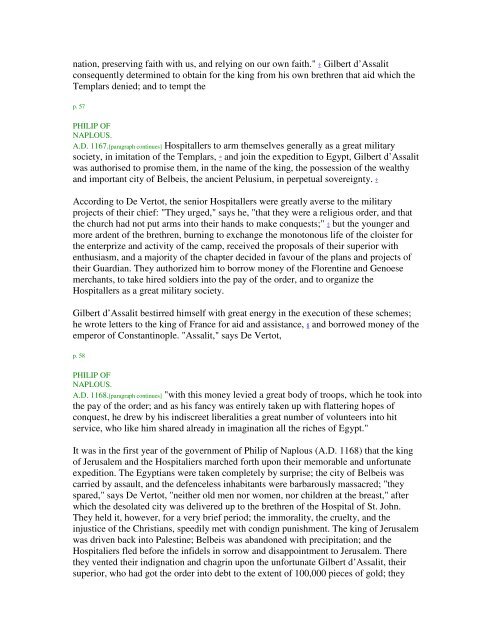The History of the Knights Templar by Charles G ... - Masonic Renewal
The History of the Knights Templar by Charles G ... - Masonic Renewal
The History of the Knights Templar by Charles G ... - Masonic Renewal
You also want an ePaper? Increase the reach of your titles
YUMPU automatically turns print PDFs into web optimized ePapers that Google loves.
nation, preserving faith with us, and relying on our own faith." † Gilbert d’Assalit<br />
consequently determined to obtain for <strong>the</strong> king from his own brethren that aid which <strong>the</strong><br />
<strong>Templar</strong>s denied; and to tempt <strong>the</strong><br />
p. 57<br />
PHILIP OF<br />
NAPLOUS.<br />
A.D. 1167.[paragraph continues] Hospitallers to arm <strong>the</strong>mselves generally as a great military<br />
society, in imitation <strong>of</strong> <strong>the</strong> <strong>Templar</strong>s, * and join <strong>the</strong> expedition to Egypt, Gilbert d’Assalit<br />
was authorised to promise <strong>the</strong>m, in <strong>the</strong> name <strong>of</strong> <strong>the</strong> king, <strong>the</strong> possession <strong>of</strong> <strong>the</strong> wealthy<br />
and important city <strong>of</strong> Belbeis, <strong>the</strong> ancient Pelusium, in perpetual sovereignty. †<br />
According to De Vertot, <strong>the</strong> senior Hospitallers were greatly averse to <strong>the</strong> military<br />
projects <strong>of</strong> <strong>the</strong>ir chief: "<strong>The</strong>y urged," says he, "that <strong>the</strong>y were a religious order, and that<br />
<strong>the</strong> church had not put arms into <strong>the</strong>ir hands to make conquests;" ‡ but <strong>the</strong> younger and<br />
more ardent <strong>of</strong> <strong>the</strong> brethren, burning to exchange <strong>the</strong> monotonous life <strong>of</strong> <strong>the</strong> cloister for<br />
<strong>the</strong> enterprize and activity <strong>of</strong> <strong>the</strong> camp, received <strong>the</strong> proposals <strong>of</strong> <strong>the</strong>ir superior with<br />
enthusiasm, and a majority <strong>of</strong> <strong>the</strong> chapter decided in favour <strong>of</strong> <strong>the</strong> plans and projects <strong>of</strong><br />
<strong>the</strong>ir Guardian. <strong>The</strong>y authorized him to borrow money <strong>of</strong> <strong>the</strong> Florentine and Genoese<br />
merchants, to take hired soldiers into <strong>the</strong> pay <strong>of</strong> <strong>the</strong> order, and to organize <strong>the</strong><br />
Hospitallers as a great military society.<br />
Gilbert d’Assalit bestirred himself with great energy in <strong>the</strong> execution <strong>of</strong> <strong>the</strong>se schemes;<br />
he wrote letters to <strong>the</strong> king <strong>of</strong> France for aid and assistance, § and borrowed money <strong>of</strong> <strong>the</strong><br />
emperor <strong>of</strong> Constantinople. "Assalit," says De Vertot,<br />
p. 58<br />
PHILIP OF<br />
NAPLOUS.<br />
A.D. 1168.[paragraph continues] "with this money levied a great body <strong>of</strong> troops, which he took into<br />
<strong>the</strong> pay <strong>of</strong> <strong>the</strong> order; and as his fancy was entirely taken up with flattering hopes <strong>of</strong><br />
conquest, he drew <strong>by</strong> his indiscreet liberalities a great number <strong>of</strong> volunteers into hit<br />
service, who like him shared already in imagination all <strong>the</strong> riches <strong>of</strong> Egypt."<br />
It was in <strong>the</strong> first year <strong>of</strong> <strong>the</strong> government <strong>of</strong> Philip <strong>of</strong> Naplous (A.D. 1168) that <strong>the</strong> king<br />
<strong>of</strong> Jerusalem and <strong>the</strong> Hospitaliers marched forth upon <strong>the</strong>ir memorable and unfortunate<br />
expedition. <strong>The</strong> Egyptians were taken completely <strong>by</strong> surprise; <strong>the</strong> city <strong>of</strong> Belbeis was<br />
carried <strong>by</strong> assault, and <strong>the</strong> defenceless inhabitants were barbarously massacred; "<strong>the</strong>y<br />
spared," says De Vertot, "nei<strong>the</strong>r old men nor women, nor children at <strong>the</strong> breast," after<br />
which <strong>the</strong> desolated city was delivered up to <strong>the</strong> brethren <strong>of</strong> <strong>the</strong> Hospital <strong>of</strong> St. John.<br />
<strong>The</strong>y held it, however, for a very brief period; <strong>the</strong> immorality, <strong>the</strong> cruelty, and <strong>the</strong><br />
injustice <strong>of</strong> <strong>the</strong> Christians, speedily met with condign punishment. <strong>The</strong> king <strong>of</strong> Jerusalem<br />
was driven back into Palestine; Belbeis was abandoned with precipitation; and <strong>the</strong><br />
Hospitaliers fled before <strong>the</strong> infidels in sorrow and disappointment to Jerusalem. <strong>The</strong>re<br />
<strong>the</strong>y vented <strong>the</strong>ir indignation and chagrin upon <strong>the</strong> unfortunate Gilbert d’Assalit, <strong>the</strong>ir<br />
superior, who had got <strong>the</strong> order into debt to <strong>the</strong> extent <strong>of</strong> 100,000 pieces <strong>of</strong> gold; <strong>the</strong>y



